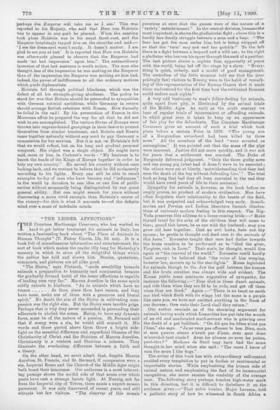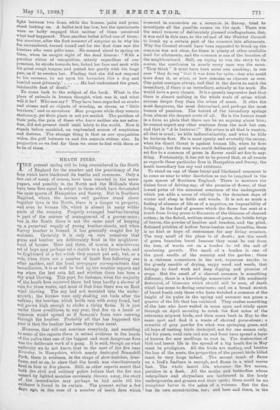" THE LESSER AFFECTIONS!'
THE Countess Martinengo Cesaresco, who bas worked so hard to get better treatment for animals in Italy, has written a fascinating book about "The Place of Animals in Human Thought" (T. Fisher Unwin, 12s. 6d. net). It is a book full of miscellaneous information and entertainment, the sort of book which makes the reader idly long for Macaulay's memory in which to store all the delightful things which the author has told and shown him. Stories, quotations, comments, and pictures are all alike good.
"The Stoics," sue Plutarch, "made sensibility towards animals a preparation to humanity and compassion because the gradually formed habit of the lesser affections is capable of leading men very far." Marcus Aurelius in the same spirit coldly exhorts to gladness. "As to animals which have no reason . . . , . . do thou, since thou bast reason, and they have none, make use of them with a generous and liberal spirit." No dqubt the aim of the Stoics in cultivating com- passion was the right aim. But the Stoics were terrible prigs. Perhaps that is why they never succeeded in persuading their adherents to abolish the arena. Mercy, to have any dynamic force, must be of the nature of a passion.. St. Bernard said that if mercy were a sin, he would still commit it, His words and those quoted above them throw a . bright side- light on the essential difference and superficial likeuess.of the Christianity of Christ and the Stoicism of Marcus Aurelius. Christianity is a ,venture and Stoicism a scheme. They illustrate the everlasting difference between p, faith and a theory.
On the other hand, we must admit that, despite Marcus Aurelius, St. Francis, and St. Bernard, if compassion were a sip, Imperial Rome and the Church of the Middle Ages might both boast their innocence. Our authoress in a most interest- ing passage shows the sordid side of that arena over which poets have cast a strange heroic light. At Nennig, not far from the Imperial city of Troves, there exists a superb mosaic pavement. It was only discovered of recent years, and still attracts but few visitors. "The observer of this mosaic perceives at once .that the games were of the nature of a variety ' entertainment." In the central division, hem:siege the most important, is shown the gladiatorial fight ; above this is a hardly less deadly struggle between a man and a beer. #' The bear has got the man under him, but is being whipped off so that the tarn' may not end too quickly." To the left there is a fight between a leopard and a wild ass ; to the right a gladiator who has run his spear through the neck of a panther. The last picture shows a replete lion, apparently at peace with the world, being led off the stage by a slave. " Every- thing is quiet, orderly, and a model of good management. The custodian of the little museum told me that the (sur- prisingly few) visitors to Nennig were in the habit of remark- ing of this representative of the Roman Games that it made them understand for the first time how the cultivated Romans could endure such sigh*"
A very odd testimony to man's fellow feeling for animals, quite apart from pity, is illustrated by the animal trials
of the Middle Ages. As early as the ninth century we bear of regular trials of inconvenient or offending animals, in which great care is taken to keep up an appearance of fair play for the defendants. The CounteSs Xeriminengo Cesaresco gives an account of such a trial which took place before a certain Prior in 1370. n The young son of a Burgundian swineherd bud been killed by three Bows." All the members of the herd "were arrested as accomplices." It was pointed out that the mass of the pigs were innocent. Justice did not move quickly, and it mime not for years that a settlement was reached. The Duke of Burgundy delivered judgment. "Only the three guilty solve
and one young pig (what bad it done P) were to be ease:muted ; the others were set at liberty, 'notwithstanding that they had seen the death of the boy without defending him!" The trial took so long that lied they all been executed in the end they would have owed years of life to their accusers!
Sympathy for animals is, however, as the book before us amply proves, no product of modern civilisation. Men have often forgotten their relationship to the beasts of time field, but it was suspected and acknowledged very early. Seendi- navian and Persian and Indian literature furnish illustra- tions of curiously modern feeling in this respect. The Rig- Veda preserves this address to a home-coming bride :—" Make thyself loved for the sake of the children that will come to thee; guard this house, be as one with thy husband ; may you grow old here together. Cast no evil looks, hate not thy spouse; be gentle in thought and deed even to the animals of This home." Zoroaster taught that men had duties towards time brute creation to be performed as to "God the giver, Forgiver, rich in Love." Their settle, he thought, would live again at "the renewal of the world." Zoroaster could hardly
limit mercy: he believed that "the voice of him weeping, however low, mounts up to time stardighte." Moses legislated
for animals, though to the Jew the gulf between the human and the brute creation was always wide and evident, The Koran yields some sentences suggestive of sympathy, for instance the following :—" Fear God in these dumb animals, and ride them when they are fit to be rode, and get oft them when they are tired." Again :—" There is no beast on earth nor bird which Sloth with its wings but the same is a people like pato you, we have'not omitted anything in the Book of our decrees ; then unto their Lord shall they return," Our author reminds us of the charming argument for animals having souls which Lamartine has put into the mouth of an old and uneducated maid-servant who is grieving over the death of a pet bullfinch. " On dit que les bates n'ont pas l'Ame," she says. "Je ne veux pas offenser he bon Dieu, maim
si mon pauvre oiseau n'avait pas d'ame, avee quoi done m'aurait-il tent airnee? Avec les plumes ou avee les puttee, pent-atre P " Madame de Staal may have had the same thought in her mind when she said " The more I know of men the more I like dogs."
The writer of this book has with extraordinary self-control avoided every temptation to put in foolish or sentimental or improbable stories. While emphasising the human side of animal nature, and emphasising the fact of its immemorial recognition, she never strains the credulity of the average man. The following story perhaps touches high-water mark in this direction, but it is difficult to disbelieve it on time
evidence given That noble hunter, Major Leveson, told a pathetic story of how he witnessed in South Africa 6 fight between two lions, while the lioness, palm and prize, stood looking on. A bullet laid her low, but the combatants were so hotly engaged that neither of them perceived what had happened. Then another bullet killed one of them : the survivor, after the first moment of surprise as to why his foe surrendered; turned round and for the • first time flaw the bunters who were mute near. He seemed about to spring on them, when he caught sight of the dead lioness : With a peculiar whine of recognition, utterly regardless of our presence, he strode towards her, licked her face and neck with his great rough tongue, and patted her gently with his huge Paw, as if to awaken her. Finding that she (lid not respond to his caresses, he sat upon his haunches like a dog and
howled most piteously.' . .• . lie had understood the great, intolerable fact of death."
To come back to the subject of the book. What is the place of animals in human thought, what was it, and what will it be? Who can say ? They have been regarded as stocks and stones and as objects of worship, as slaves, as " little brothers," and as ancestors. Men progress while they remain stationary, yet their place is not yet settled. The problem of their pain, the pain of those who know neither sin nor salva- tion, did not present itself until lately to the world. Now it stands before mankind, an unplumbed source of scepticism and distress. The strange thing is that as our sympathies widen, the gulf between us and the animals widens also. In proportion as we feel for them we cease to feel with them or to be of them.











































 Previous page
Previous page